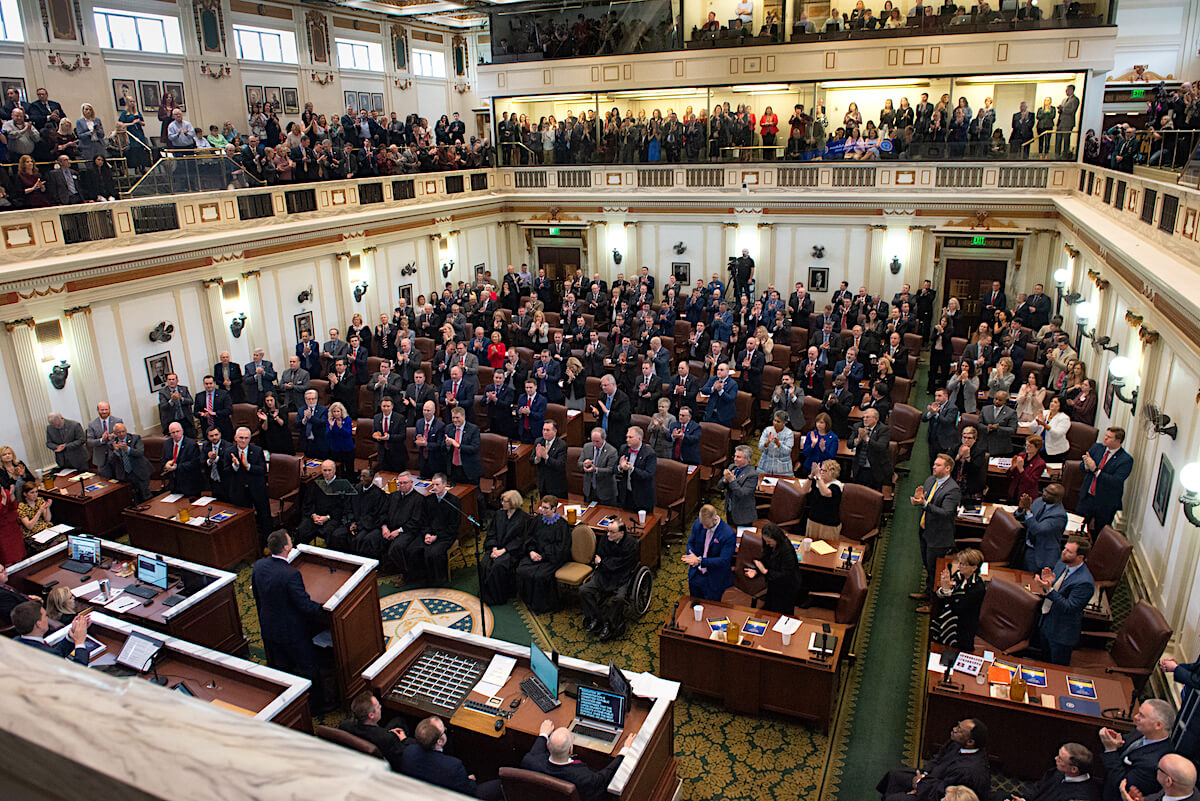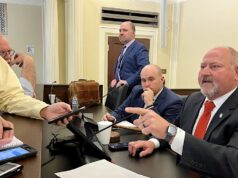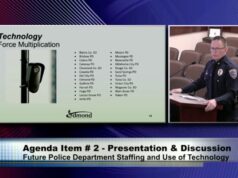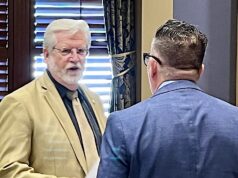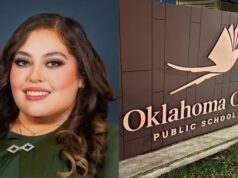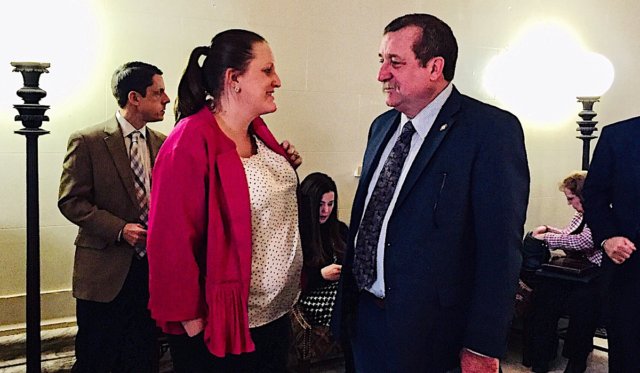

Entering week six of Oklahoma’s 2019 legislative session, some lawmakers believe it is time to hear more public discussion about education funding options.
“I’m actually disappointed that education hasn’t been more of a topic,” Senate Minority Leader Kay Floyd (D-OKC) said Thursday. “We spent a lot of time on Constitutional Carry, we spent a lot of time trying to give the governor control over the agencies. But the main issue that we see as being of paramount importance to the people of Oklahoma is education, and there’s just not enough discussion.”
Conversations about #oklaed could ramp up today at the Capitol. Facing criticism, the online-based Epic Charter Schools is hosting an advocacy day, and Oklahoma City Public Schools educators (affiliated with the American Federation of Teachers) begin spring break today.
But underscoring Floyd’s point is a revelation made by Senate President Pro Tempore Greg Treat (R-OKC) during his March 4 media availability: This year, the leader of the Senate has not yet met with the Oklahoma Education Association, the state’s largest teacher organization.
“I’m open to a conversation always,” Treat said. “My first eight sessions out here, they never darkened my door until last year. So it’s not shocking to me. I’m assuming, after this question and one of you all publishes, I will receive a meeting request.”
OEA president Alicia Priest confirmed March 6 that she has not requested a meeting with Treat but said she “absolutely” will.
“The (teacher pay raise) legislation started in the House, so that’s where we started,” Priest said. “He has been having meetings with the OEA because the OEA is our members.”
Priest said her message for Treat and other lawmakers is that the Board of Equalization certified hundreds of millions of new dollars that can be appropriated.
“Now is the time to continue to fill that big hole that had been dug over the last 10 years,” she said.
April 1 funding deadline approaches
After years of pressure and debate over how to raise revenue, the Legislature found a load of fill dirt March 28, 2018, when it passed a tax package to fund an average $6,000 teacher pay increase, a support staff pay increase and add other money into the education funding formula. It marked the first time lawmakers had met the April 1 “full funding for education” deadline established by the Legislature in 2003.
RELATED
House moves $1,200 teacher pay raise, Senate sees classroom priority by Tres Savage
Days later, however, school districts shut down classrooms and educators from across the state rallied at the Capitol for two weeks. The timeline raises questions about whether legislators should rush to meet the April 1 consequence-free deadline this year.
“I’m not going to operate from a place of fear, so we are going to do what is best,” Treat said. “If we get an agreement on an education budget early, we won’t let last year’s experience taint our view of whether that’s a good idea.”
Priest said the OEA’s delegate assembly approved a resolution for 2019 regarding the April 1 date.
“It says, ‘If the funding hasn’t happened for our year-two package by April 1, then we will have a statewide concerted activity,'” Priest said. “So that’s very open-ended, and a walkout is one of 1,000 possibilities that would be a statewide concerted activity. A walkout is never the goal, and that is key.”
Flanked by OEA members in December, Priest announced her organization’s “year-two package,” which features four key provisions that would cost upwards of $400 million:
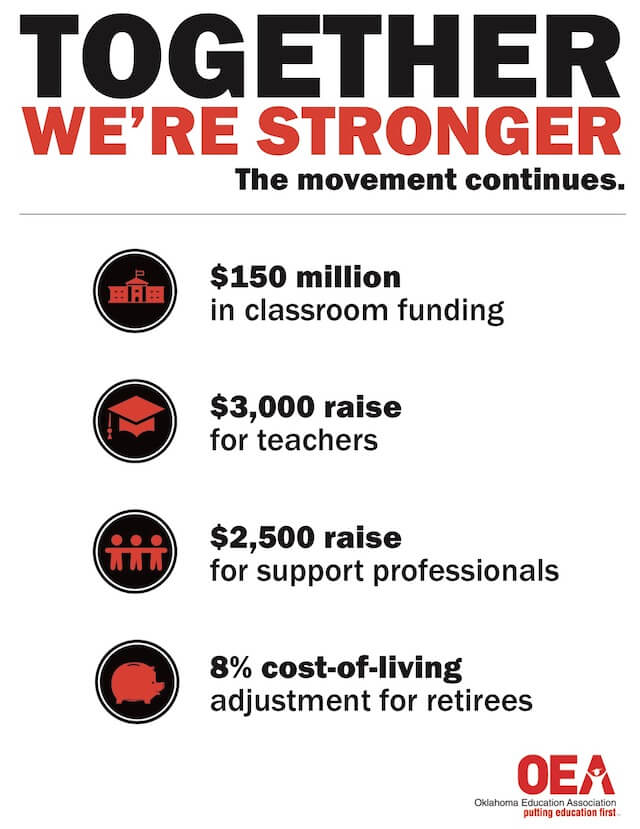
Echols: ‘Education is going to have a wonderful year’
As things stand today, only two of the OEA’s four goals have made tangible movement through the legislative process, and those measures are smaller in nature than the association’s request. The House has sent a $1,200 across-the-board teacher pay raise to the Senate, and it is preparing this week to do the same with a 2 percent COLA for pensions of educators and other state employees. (Amendments have been filed on the COLA bill that would raise it from 2 to 4 percent.)
While lawmakers have spoken sparingly of raising support staff salaries, they have emphasized a need for putting more dollars “into the classroom,” a phrase that functionally means allowing school districts to spend additional money in a myriad of ways: hiring more teachers to decrease class sizes, hiring more support staff and/or purchasing more educational materials.
“There is no agreement on that part yet, but we’re all dedicated to getting more money into the classroom and into teachers’ pockets,” Treat said Thursday.
House Majority Floor Leader Jon Echols (R-OKC) agreed and said he has met with OEA, Professional Oklahoma Educators, the American Federation of Teachers and other groups.
“I believe education is going to have a wonderful year in the Oklahoma Legislature,” Echols said.
But some lawmakers would like to see a more unified and organized engagement effort from educators inside the Capitol.
“I’m a little confused, I’m not going to lie,” said Rep. Jacob Rosecrants (D-Norman). “Getting so many educators up here elected, I thought it was just going to be amazing and unified. I haven’t seen that. We’re on the same page. There is a unity between us, but there’s just nothing really organized.”
Rosecrants said he had hoped to formalize an actual “education caucus” with a chairman, vice chairman and regular meetings. For now, though, he is examining policy bills every Monday morning with about a half dozen other education-focused House members.
“I don’t know if it needs to be organized or grassroots,” Priest said of a potential education caucus. “What I believe in is giving people space to have those conversations.”
Priest and other OEA leaders have been having conversations with Rep. Mark McBride (R-Moore) who serves as House Appropriations and Budget Education Subcommittee chairman.
“I know that they want something by April 1. I just don’t think, in my conversations with OEA, that’s their priority,” McBride said. “Their priority is to get funding for education, not to walkout. And they feel comfortable that [the Legislature is] going to do something.”
McBride, who famously signed his name alongside three House Democrats to crystalize last year’s historic revenue agreement, said educators should be optimistic.
“I think the Legislature has gotten the message,” McBride said. “Things are going to get done. We are still just a month into this.”
McBride said he has submitted his education budget recommendation to House Appropriations and Budget Chairman Kevin Wallace (R-Wellston).
“(It) isn’t everything everybody wants, but it’s a pretty large deal,” McBride said. “I think a lot of it is going to depend on the Senate. They were upset that we fired the teacher pay raise bill over there with the title on. It’s just going to depend on how everything shakes out.”
‘The people of Oklahoma want money in our classrooms’
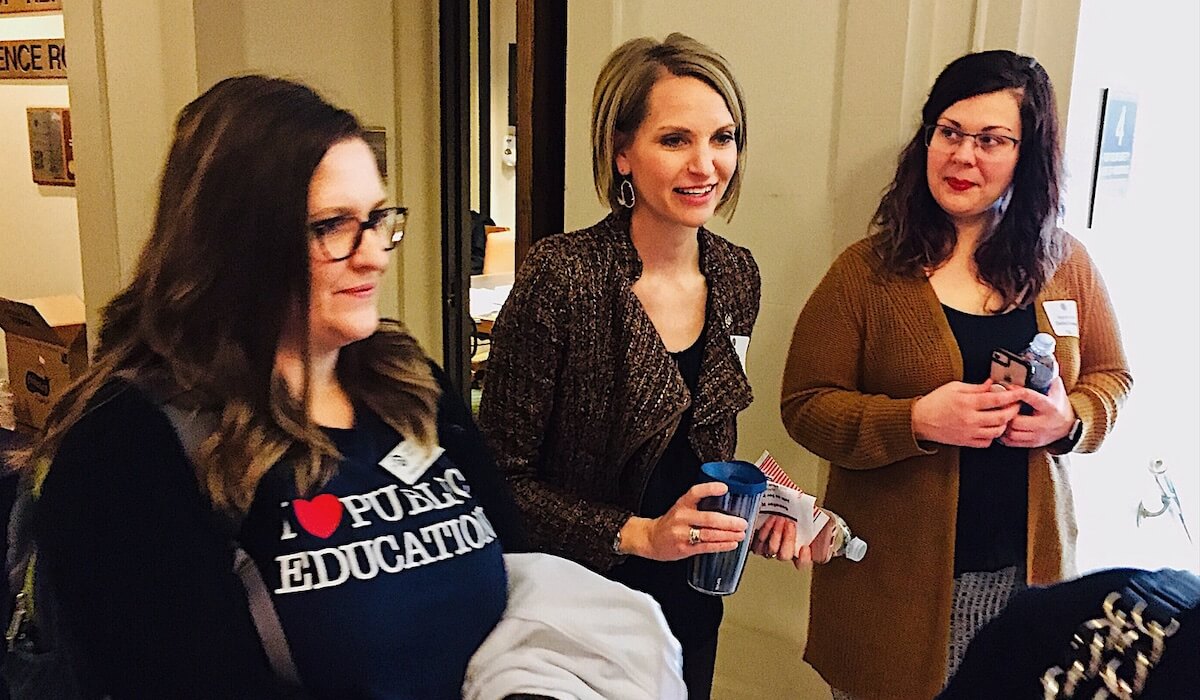
In the Senate, members of both parties want to see more dollars added to the education funding formula.
“The thing I’m most concerned about is that there haven’t been continuous conversations around classroom funding. I think the governor was pretty clear at his State of the State that he was calling for a $1,200 (teacher pay) increase,” said Sen. Carri Hicks (D-OKC). “But beyond that, we’ve obviously not been listening closely to the concerns that classroom teachers were expressing last year, which were that we needed more resources into the classroom.”
Sen. Ron Sharp (R-Shawnee) echoed Hicks.
“I’m concerned that our leadership might not have seen the effects of last election. The last election was clear that the people of Oklahoma want money into our classrooms,” Sharp said.
Like Hicks and Rosecrants, Sharp is a former teacher. Asked about OEA leadership not yet meeting with Treat, Sharp said lawmakers should already understand the situation.
“You can get on the internet and see what teachers are concerned (about). They told us last year,” he said. “We had thousands of them up here last year. They told us they need money in the classrooms.”
But Hicks expressed surprise to learn Treat had not met with Priest this year.
“I think that is concerning. I think it would cause everyone to say, ‘Why hasn’t that happened?’ Especially because I think — in true teacher spirit — you want to be preventive, you want to be proactive, you want to do your best to get ahead of a situation,” Hicks said. “On the flip side of that, I have been in continued conversations with the organization. They are a membership-led organization, and they pretty well have laid out their three-year plan.”
To that end, Hicks said educators from Putnam City Schools have been gathering at the Capitol each Tuesday morning.
“I continue to be optimistic that they are coming and making their case,” Hicks said. “The battle cry, if you will, was that we would ‘Remember in November,’ and we did.”









